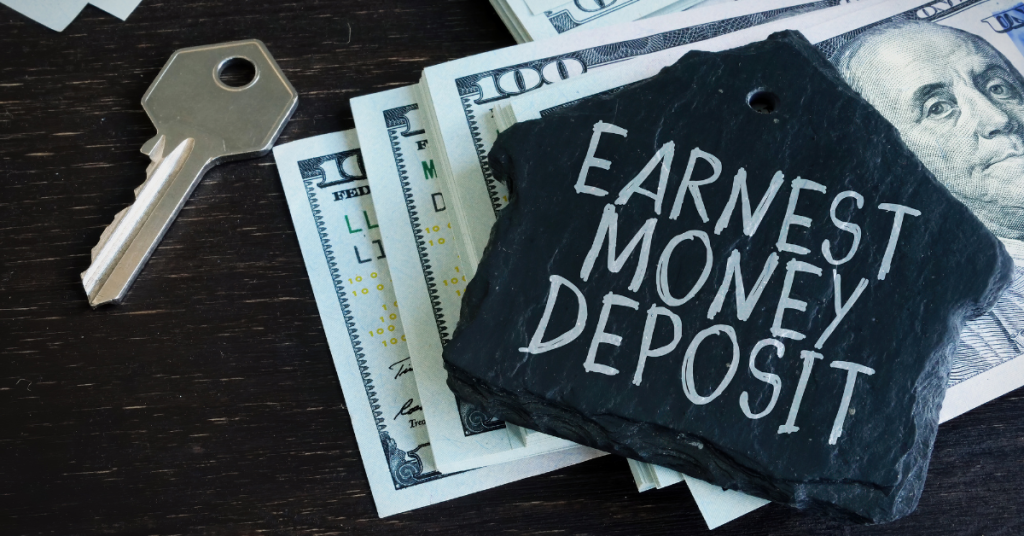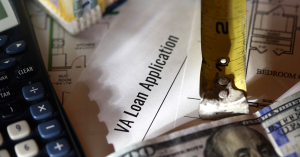Based on my extensive experience, navigating financial terminologies and procedures can often feel overwhelming when purchasing a home. Among these, the concept of an earnest money deposit, especially concerning a VA loan, is pivotal yet mystifying for many.
So, what exactly is an earnest money deposit? How does it impact a VA loan? This article will shed light on this financial option. It will explore everything you need to know about earnest money deposits and illuminate its intricacies. So, are you ready to unravel the mystery of offering an earnest money deposit in the context of a VA loan? Let’s embark on this enlightening journey together.
What is a VA Home Loan?
A VA home loan is a mortgage loan backed by the Veterans Administration, enabling service members, veterans, and their surviving spouses to access mortgages without requiring a down payment or excellent credit. This unique loan type aims to assist eligible individuals in buying, building, repairing, retaining, or adapting a home for personal occupancy. These loans are advantageous due to their more flexible qualification standards and often lower interest rates.
Using a VA Loan in Buying a House

The VA loan process for buying a house is similar to other loan types but has unique benefits and considerations. Here are some benefits of a VA loan:
- Favorable credit requirements
- Lower interest rates
- Zero down payment
This can make homeownership a more attainable goal for veterans and active service members.
Steps in VA Loan Process
Obtaining a VA home loan involves steps eligible veterans and service members must follow. Here are some essential steps involved in the VA loan process:
Step 1: Prequalification
VA loan prequalification is the first step, giving a rough estimate of the buyer’s ability. It usually begins with a prequalification stage, where potential borrowers provide their lenders with an overview of their financial situation.
Step 2: Find a Lender
Next is finding a VA-approved lender where borrowers take the time to shop around and compare quotes from different lenders to find a competitive interest rate. With preapproval, borrowers can make solid and credible offers.
Step 3: Appraisal
If the offer is accepted, the VA lender will require a home appraisal to ensure the home’s value aligns with the loan amount. During this time, earnest money is usually considered a sign of good faith.
It’s also essential to consider getting a VA loan, even with bad credit. The VA home loan bad credit program is available to potential homebuyers with subpar credit scores yet are otherwise qualified.
What is Earnest Money Deposit?
An earnest money deposit, or good faith deposit, is an initial cash deposit from homebuyers to their sellers, signifying the buyer’s serious intent to purchase the property.
In the home-buying process, earnest money plays quite a significant role. It demonstrates the buyer’s commitment to following through with the purchase. This deposit is substantial in a VA loan, as it establishes the buyer’s credibility and eases the seller’s concerns about the buyer backing out.
Do VA Loans Require Earnest Money?
While not mandatory, providing earnest money when utilizing a VA loan is a common practice that reassures the seller about your motivations. The earnest money deposit clearly indicates a buyer is serious about purchasing the home they’ve set their sights on.
When a buyer puts down earnest money, it communicates to the seller that they are genuinely interested in the property and willing to finance it earnestly. However, it’s not uncommon for a seller to make this request. Asking for earnest money in competitive markets is often a tactic sellers use to filter out less serious buyers.
VA has the following requirements for earnest money:
- Source of Funds: The VA mandates that the earnest money deposit must come directly from the buyer, not as a gift or loan. In this case, VA will verify the source of funds.
- Verification Process: Just like verifying your down payment amount, the VA will assess the source of the funds to ensure compliance.
Remember that the earnest money deposit doesn’t affect the overall loan or down payment amount. Its primary purpose is to give the seller some financial assurance during the purchase. If all goes well, it’s typically converted into part of your down payment or closing costs at the end of the transaction.
Earnest Money With A VA Loan Pros and Cons
Before offering earnest money with a VA loan, weighing the potential advantages and disadvantages is necessary. This evaluation helps buyers and sellers make informed decisions that suit their unique situations and needs.
Here’s a table showing the pros and cons:
| Pros | Cons |
|---|---|
| Securing The Seller’s Confidence: Providing earnest money can reassure the seller of your serious interest. | Potential Risk of Loss: There’s always a risk of losing your earnest money deposit if the sale doesn’t go through due to terms not covered in the agreement. |
| Negotiation Leverage: A willingness to offer earnest money may provide negotiation leverage with the seller. | Locked-In Funds: Once you make an earnest money deposit, these funds are locked into the transaction, potentially affecting your liquidity. |
| A Show of Good Faith: The earnest money deposit demonstrates you’re agreeing honestly. | Source Verification: VA loan lenders will likely require you to verify the source of the earnest money deposit. |
Understanding this information can provide helpful guidance in deciding whether or not to offer earnest money with a VA loan.
How Much Earnest Money is Required for a VA Loan?

No fixed rule determines how much earnest money is needed when utilizing a VA loan. The amount can differ based on the following factors:
- The local real estate market state
- The seller’s inclination
- The buyer’s financial conditions
Generally, it can be between 1-5% of the home’s purchase price. When selecting the appropriate amount, it’s important to consider contacting a real estate agent to guide you through the process. This way, you stand a better chance of getting your offer approved.
Earnest Money Refund
In certain situations, earnest money may need to be refunded. It should be refunded to the buyer if the real estate transaction doesn’t go through due to specific contractual contingencies.
Here are some contingencies that offer protection against losing earnest money:
- Home Inspection Contingency: This allows you to renegotiate or withdraw your offer if the home inspection reveals substantial issues.
- Appraisal: Protects you if the home’s appraised value exceeds the purchase price, allowing you to back out of the deal.
- Financing: Ensures you get your money back if your loan approval falls through after making the earnest money deposit.
- Selling Existing Home: This lets you retrieve your deposit if you cannot sell your current home within a specified time frame.
To receive a refund, buyers typically need to submit a request to their escrow account agent or attorney, specifying the reasons for the refund based on the provisions of the purchase contract.
What Happens to Earnest Money at Closing?

The earnest money deposit plays another role during a real estate transaction closure. It becomes part of the down payment or closing costs at the closing. In case of a simultaneous closing with a VA loan, the deposit could also be applied to the interim interest or home insurance premium.
An earnest money deposit is critical in buying a home utilizing a VA loan. It is an affirmation of the buyer’s interest and intent to purchase, providing reassurance to the seller against potential sale failures.
From my extensive experience, utilizing the VA loan, including earnest money deposit, adds an extra level of trustworthiness for the buyer, making their offer stand out among others. A diligent buyer has to grasp earnest money deposit intricacies to navigate effectively in the home-buying journey utilizing a VA loan. It involves putting down the correct amount, understanding the refund conditions, and knowing its importance at closing.
Frequently Asked Questions About Earnest Money Deposit VA Loan
Do you pay earnest money with a VA loan?
Yes, you pay earnest money with a VA loan, even though it’s not an explicit requirement. Paying this deposit can make your offer more appealing to the seller as it shows your clear intent to purchase.
Does a VA buyer get earnest money back?
A VA buyer can get the earnest money back if the deal doesn’t go through due to valid conditions outlined in the purchase contract. Examples include when financing falls through or significant issues are discovered during the home inspection.
How is the earnest money deposit usually applied at closing?
The earnest money deposit is usually applied towards your down payment and closing costs at closing. This means the money you need to put down as earnest money goes towards the cost of the house and other expenses when finalizing the deal.






